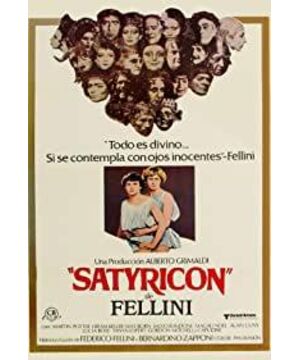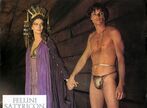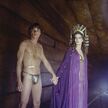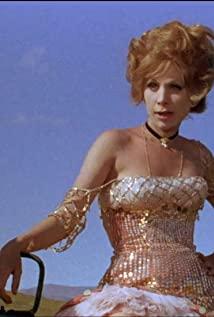Original address: http://www.qh505.com/blog/post/5475.html
The friend Ashdo had grown old and finally fell in the desert; the poet Omope could no longer write poetry, he left a legacy of freedom - while death kept coming, it was new to Nkopi. The beginning: Ashdo died in the desert, and the revelation to Nkopi was: "I'm going to find something happy to make up for my youth." When Omope died, not only did he leave a legacy, but It is hoped that fellow clansmen will tear up their corpses and share their food—an ancient ritual that keeps the body alive. Old age and death unfolded before Nkopi, and when one state ended, another began: he and the slaves boarded the big ship bound for Africa, where a distant island seemed to be calling him, And the lost youth seems to be coming back in another way.
Is this Fellini's optimism? He once said that this is not a film about the history of ancient Rome, but a science fiction film - history is upstream in the flow of time, and to reproduce it in a film is to return to the starting point of history: this film originally titled " Satiricone, adapted from the novel of the same name in the first century AD, and the author of the novel, Albitro, was a close friend of the famous lustful tyrant of Rome, Nero. The novels of the first century AD, the close friends of the tyrants of ancient Rome, the hedonistic life of the Roman Empire, this is the "history" in the film, but history is only an appearance, even a symbolic background, when it becomes a A "myth" that points to the future after death continues, as the subtitle in the trailer says: "Rome, before Christ, after Fellini" - in the absence of religion before and after film Is it possible to place the "youth" of the Romans in the middle area that comes out?
Nkopi said that he wants to find true happiness because youth has been wasted too much, just like Rome, in the journey from history to the future, it has also lost too much, standing in the "after" dimension. Fellini no doubt seeks the true meaning of happiness for Roman youth. Why does Nkopi want real happiness and where did his youth go? Fellini's first shot seems to begin to answer this question: looking down, a wall of graffiti appears, and Nkopi stands there muttering: "I escaped the trial, I escaped the arena, my hands Full of blood, I ended up destitute, I was exiled, and I lived in a country, who left me alone?" His trial, his exile, and the blood on his hands, all proved that he was close to death , even one foot has stepped into the abyss of death, but even if you are poor, even if you are alone, Nkopi's question is at least sending a signal: what I lose will definitely be what I want to get - lose What you want is identity, status, friends and love, and no doubt what you want is identity, status, friends and love.
And when Fellini gave Nkopi an opportunity to question himself from the perspective of God, he may be walking in the history of "before Christ". That skylight to the sky? Below was the dark, damp, death-filled breath, and above it was bright, open, and gleaming with beautiful stars. Therefore, God is in the sky, and God is watching. Only by jumping from the history below can we reach the future above and have a "love myth" after giving up the sad youth. But there is no doubt that the impoverished and lonely Nkopi was trapped in his own destiny, and his angry voice was only to find the "who" who changed his destiny.
"Who" or Gil-dong, whom he loves, Nkopi said to him in the era when same-sex love was allowed: "You are the sun, you are the ocean, you are the goddess." So Nkopi made no secret of it Said: "I love you, Jidong." But Jidong was not by his side. At first, he and Ashdo were together, and Ashdo, who had enjoyed the love of fish and water, was still immersed in the love that night, even if they In that prison together, "he was like a prostitute in prison." But for Nkopi, scolding him was just a way of venting, and in the process of being exiled, he found Gildong again, and at this time Jidong has become a slave of Venajue. For his love, Nkopi knelt in front of Venajue and begged. He was already destitute, but he would rather give his last dignity. When he finally took Jidong's hand back. When he got to his place, he seemed to have found his love again, they kissed, they hugged, he and he were no longer alone.
But Ashdo appeared again, and when they distributed their things to leave, Nkopi let Gildong choose, not wanting to give Nkopi all his dignity for him, but nothing: Gildong pulled Ashdo up again hand, left Nkopi. Friends left, love disappeared, and in the dignified reality, Nkopi fell into despair, he saw the knife, and prepared to say goodbye to this painful life by suicide. This is Nkopi's attempt to die. It is the betrayal of love that makes him lose hope for life, and this "who" not only makes him alone again, but also pushes him into the real abyss of his destiny.
But Nkopi did not die because another death was more violent: the earth shook, houses began to collapse, and an earthquake struck without warning. In the shaking, people started to shout, start to flee, start to chaotic, and Nkopi also gave up dying, so in this sense, death became a kind of salvation, and this saved him from the abyss of fate The death also broke through the personal grievances and turned into a collective encounter. This is a symbolic event, and an extension of love: the love that was trapped in its own world is gone, it has become human thinking about life. From childhood to adulthood, Nkopi began a search: Who created death?
"Who" or the dove who builds his own kingdom with desire. Nkopi, who lost Jidong, came to the place where the feast was being held, where the horse dove feasted the guests, people toasted and drank, and people enjoyed the gluttonous feast, "Delicious food is our asset." Said that in this place full of desires, everyone lost himself, everyone became hedonist, and in the carnival, death also became part of it: after the feast, the horse dove held a funeral, He went into the tomb, and lay there, and the guests became those who attended the funeral, and before closing his eyes, the weeping horse dove said, "Everyone dies, and we love the living world." When the funeral becomes a kind of In games, when death is teased, that living state immersed in desire is undoubtedly a kind of irony, but in fact, when the dove says "alive", everything begins to die: the one who thinks that the dove has stolen The guest of Lucretius' verse is thrown alive to the fire, which is the death of sincerity; the drunken man at the banquet performs Homer's play, turning the classic into a farce, which is the death of art; It is the death of knowledge to think of yourself as a philosopher, but the philosophical world knows nothing about him...
Sincerity is dead, art is dead, knowledge is dead, and the body is dead, then living actually only means satisfying the most primitive desires. Enkopi, who participated in it, was actually brought in by the poet Omopp, when he After seeing the living death, hear Omopp say: "This city-state is only greedy for money." But when all is dead, what can restore the glory of this city-state? Omope said to Nkopi: "Poets may die, but poetry is forever. I leave poetry to you, the seasons to you, the sun and the sea to you." This is the poet's enlightenment to Nkopi , the eternal meaning of poetry is that the four seasons, the sun and the sea are poetic, and they are a weapon against greed.
Poet Omop is like Nkopi's mentor to find happiness after his death. It was after this funeral that he began to search for poetry, began to re-understand the four seasons, the sun and the sea, and began to explore the meaning of life. Undoubtedly, Nkopi, who was poor, alone, and lost his dignity and love, was full of ups and downs on this search road, and even contained desires that he could not get rid of himself, so Nkopi was contradicting Moving forward, exploring in hardships, and even paying a heavy price, but the most important point is: he did not die, he lived, and began to love this living world, in pain and struggle, hardship and danger, seeking True youth: youth of self, youth of Rome.
"You have to live and enjoy the joy of life." This is Omopp's advice to him. Here, the joy of life has actually been separated from the desire world of the dove. For Pi, it is also full of misunderstandings about the joy of life. He saw the death of the tyrant on the ship that held the slaves, and the "Caesar of the Sea" ruled over those slaves, but they were met by warships, and at last they were attacked by warships, and the Caesar of the Sea was killed, but when a tyrant died, the other A tyrant reigns over them again, and when one order is disintegrated, another order is used to live, living, perhaps without freedom; and to have freedom, also lies in having one's own pursuit of the joy of life. Nkopi heard a story that the woman's husband died and she stayed by his side every night; the body of the thief was hanging outside, and the soldiers guarded the thief. When the woman started to cry, the soldier heard the voice, he went to the widow, persuaded her not to go on a hunger strike, and gave her water, so the two burst into flames of love, and later the thief's family secretly released the thief, and the soldier would probably Being punished, he was ready to die in desperation, but the woman came up with a way, they hung the body of her husband and replaced the thief, and the two were together forever.
The tyrant was killed as the replacement of the old by the new order, and the dead husband was hanged as a thief in search of freedom in the name of love: be it a widow or a soldier, they lived outside the order, they The only idea in the heart is to obtain the joy of life, and love is the expression of this joy, as Omopp said of poetry, after the death of the poet, poetry is eternal. So for Nkopi, an experience and a story, in the complex relationship between life and death, appreciate the difference between instant and eternal. In fact, these two things don't seem to give Nkopi the best answer. About love, about freedom, about the joy of life, he needs more experiences, more transformations, and more pain and struggle.
Nkopi has a misunderstanding about being alive, when he lost Gil Dong and was about to commit suicide with a knife, the earthquake seemed to save him, but the earthquake was also a disaster, after ending the thought of suicide , also leading him into a kind of doomed labyrinth. So when they were with Ashdo, they were in the house of their dead master, chasing a slave girl who was hiding in a corner, and indulging in that pool of water, he just looked up at the corner of the sky where he saw the stars twinkling—the There must be no God up there; they killed the old men who were guarding the demigods, and then stole the demigods who could cure diseases, and after losing the water, the demigods died of thirst, and Nkopi and Ashdo killed his accomplices again - when they caused the death of others, they must not have repented for their stealing; when he was dueling with the bull-faced man, he was still desperately pleading, and this kind of begging was turned by the bull-faced man. People regard it as a kind of "wisdom" - this is the wisdom of losing dignity and compromise, where can there be real freedom? So in the celebration called "God of Joy", when Nkopi pounced on the beautiful Ariadine, he knew that he had lost the ability to have sex, and the celebration of "God of Joy" became a mockery of him...
In fact, Nkopi is exploring the edge of desire for life and death. His body constitutes a symbol of the world of life and death, but it is too far from true joy. Even when Omopp appears, he wants to restore himself to desire. , and only at the most elementary level, even in the debauched world presupposed by the dove, and Nkopi's "impotence" is in a sense an allegory of the death of the age: there can be no more Love, no more poetry. The ritual of the master's death seems to be an irony of this era: the man carved a knife on his wrist, and the blood flowed out, while the wife prepared a brazier, and when the man's blood ran out and fell, the woman followed him. Before the death, they had sent their children away, "they will surely arrive safely." Children are hope, and sending away hope means that there is only despair, so the master said before death: "The four seasons have become different from before. In the past, in Africa, there were lions who would walk into the tent, but they never hurt people, and they would walk away peacefully in the end, so the four seasons at that time were poetic, when people and animals coexisted harmoniously, It is precisely because of this that they have to leave this era in the form of death, a farewell that does not bring pain, but complete relief.
Therefore, the death of the body can be exchanged for liberation, and even in exchange for the perpetuation of the spirit, so the death of the master is a tribute to that era, and Nkopi and Ashido's playfulness and possession of the slave women after the death of the master is actually still immersed in In the pleasures of the flesh, and the final impotence is a punishment. Before the ship set off for Africa, Nkopi heard the last story about physical punishment, the witch Ozhudai was once a beautiful woman, but the wizard fell in love with her, when Ozhudai told him: "In the middle of the night, I'll put down the basket and hang you up." But the witch hung the wizard in the air, so the wizard angrily began to take revenge, he led the whole town into eternal darkness, and the word the wizard left them was : "The fire you want is all under Ou Zhudai." So people took fire from under Ou Zhudai. While lighting up people's lives, the fire under Ou Zhudai dried up. , and finally she died in a world without fire.
Unlike the story of the widow and the soldier, what they pursue is the meaning of life beyond the form, and this love between the witch and the wizard is full of the seeds of revenge, and finally ends with the destruction of the fire of the body. It is also the fire of desire. When the fire is extinguished, it is a kind of punishment, and only by escaping the joy of the flesh and entering the eternal world of poetry, that fire is the fire of the spirit, the fire of freedom, the fire of life. fire. So after Nkopi said "great mother's love, have you seen my shame?", he began to repent of his desires - and he also rushed to the fire, and Nkopi stood in the rebirth from the ashes. Come out: "I have been cured." At this time, Nkopi's heart is no longer a desire, but a dream, "I fill myself with dreams." After Ashdo and Omope died one after another , After Nkopi died physically, he got on the boat that set off for Africa, as if he was looking for the lion who was friendly with people, looking for the poetic seasons, looking for immortal poets and poems.
There has been the confusion of "my sword has become dull", the incompetence of "his scepter has gone out of control", met the dove who lives in greed, the lady who lives with the flesh, who can foresee the future but cannot. For Nkopi, the demigods who predicted his own life and death, and the wizards who died when the fire under them died. For Nkopi, all these experiences revealed the ultimate meaning of birth and death. The ceremony of the god of joy is probably just a game, and the kingdom of joy is probably non-existent, so in this first-century Rome, when Fellini in the twentieth century used "myths" to weave love, he called for immortality Art and poetry, eternal freedom and joy, "I leave you poetry, the seasons, and the sun and the sea." - After Fellini, another "living" Rome.
View more about Fellini Satyricon reviews











